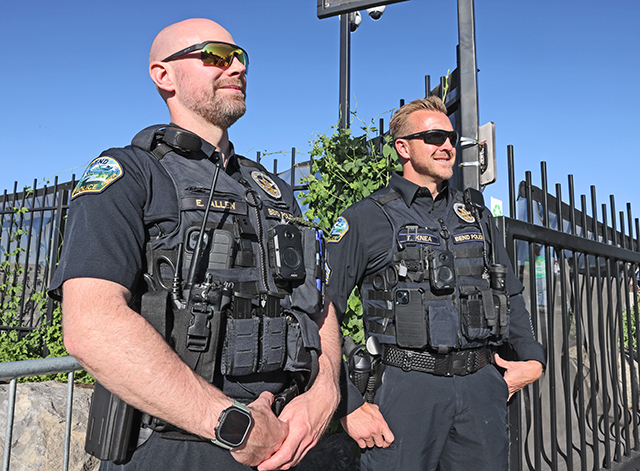Guitar-making shop to open in Sisters
Published 12:24 am Sunday, January 12, 2014

- Rob Kerr / The BulletinAcclaimed guitar craftsman Preston Thompson tunes one of his guitars at his new workshop and showroom in downtown Sisters. His business will have a grand opening celebration next weekend.
Five guys with a stash of wood rescued from an 85-year-old shipwreck are looking to turn Sisters into a place where you can not only hear good acoustic and folk music, but get the instruments needed to make it as well.
“It just seemed like a natural fit,” said Preston Thompson, an acclaimed luthier, or guitar-maker, who came out of retirement about four years ago and is now opening his own guitar workshop and showroom on Main Avenue in Sisters.
Set to open Friday, PK Thompson Guitars will sell handmade acoustic guitars that resemble instruments produced in the late 1920s and 1930s and are designed to last for 100 years (See “If you go”).
The guitars, including one Thompson is building for actor and local resident Matthew Fox, cost between $4,000 and $15,000 apiece. But Thompson said the price isn’t too steep considering his instruments are custom-built so that their owner gets the best possible sound for the type of music they like to play and how they play it.
The craftsmen
Thompson, 57, studied guitar making at the School of Guitar Music and Design during the late 1970s and perfected his craft while working at Randy Wood’s Old Time Picking Parlor in Nashville, Tenn. Modeled after a type of guitar built between 1929 and 1939, Thompson’s instruments became a must-have for flatpicking and fingerstyle guitarists like Charles Sawtelle of the 1980s bluegrass band Hot Rize and Peter Rowan.
“When I was in the business several years ago my instruments got in the hands of some pretty notable people,” said Thompson, who decided to take a break from guitar making for a couple decades and settled down in Central Oregon to retire.
But Thompson’s plans for an early retirement were shattered thanks to the Internet and the resurgence in popularity of bluegrass and folk music over the past five to 10 years. When people who’d seen one of his guitars in a video or a pawn shop started calling Thompson out of the blue to ask if he’d make one for them, he came out of retirement to honor their requests.
“One thing led to another and I decided to give it a shot,” said Thompson, who has been making guitars out of a small 4,000-square-foot workshop above the garage of his Bend home since 2011.
But he soon ran into some growing pains.
“When you’re doing this above your garage in Bend,” Thompson said, “it’s kind of hard for people to find you.”
So Thompson teamed up with Dan Stewart and David Blakeslee to form PK Thompson Guitars, LLC, in September of 2012. The new partnership started building on Thompson’s reputation, and that of his instruments, by setting up booths at the Sisters Folk Festival and other music-related events in the Pacific Northwest.
It also set out to expand Thompson’s production capacity from the 12 guitars per year he could build in his garage workshop to an ambitious long-term goal of between 60 and 100 guitars per year.
Working toward this goal involved converting an old building next to The Belfry, an event venue in Sisters, into his new workshop — a space with a showroom and a commercial spray room — and hiring two more guitar-makers.
“We’ll build about 30 to 35 guitars over the coming year,” said Gareth Jenkins, a luthier from Portland who joined Thompson’s team this past fall. Because each guitar will be custom-made, “you get a relationship with the builders when you buy an instrument,” Jenkins said.
That relationship — which is built around a series of meetings designed to determine the buyer’s musical preferences and playing style — is part of the package Thompson sells with his instruments.
It’s also the source of a lot of fun that he and his fellow craftsmen are having in their new venture.
“Every person is different,” Jenkins said. “They all have different personalities, and that can be fun.”
The instruments
While Stewart talks on his cellphone with a judge in Houston who’s interested in buying a guitar and a guy in Colorado who’s on the fence, Thompson grabs a guitar from his workbench and strums a few notes to check out how it sounds.
Each time he plucks a string it sends a vibration through the bridge that causes the top part of the guitar — typically made of a spongy, lightweight wood like spruce — to push air in and out of the instrument’s hollow body and make the sound everybody hears.
Thompson said the back and sides of his guitar — which are made out of a denser and most often darker wood like mahogany or rosewood — filter out or amplify some of these vibrations, affecting the tone or the color of each note played.
“Musicians can tell the difference between a mahogany guitar and a rosewood guitar,” Thompson said. Part of his customization process, he said, involves figuring out what tone wood best matches the buyer’s style and preference.
And that’s where he runs into a problem.
That’s because Brazilian rosewood grows exclusively in the Brazilian rain forests near Bahia and Rio de Janeiro, an area that was clear cut for decades so farmers could use it to graze cattle and to open the door for new development and expansion.
In an effort to keep the few remaining trees from being wiped out completely, the Convention on International Trade in Endangered Species of Wild Fauna and Flora added Brazilian rosewood to its most endangered species list in 1992 and banned it from being harvested and traded.
Thompson said Brazilian rosewood’s status on the CITES list gave rise to a secondary market in which people salvage trees that have already been chopped down — like those that were supposed to float down a river to a timber mill but sank instead — so they can be used again.
Through this market, Thompson said, one of his buyers managed to track down a ship that was carrying several of these trees to Europe in the 1930s but sank off the coast of Spain. He managed to get enough of the wood to make 60 guitars.
Orders have been pouring in. One of the guitars is being built for Fox, the actor, who’s best known for his roles in the television shows “Party of Five” and “Lost.”
Thompson said Fox really likes to play the blues, so he’s building the guitar entirely out of rosewood so it gets a deep tone. He said Fox also wanted his instrument to have “a turn of the century vibe” so he’s adding fancy inlays and bordering to meet that request.
The amount of work going into building Fox’s specialized guitar does beg one question: Can he play?
“He can hang,” said Stewart, who’s quickly becoming Thompson’s not-so-silent silent partner. “But not with these guys.”
— Reporter: 541-617-7816, mmclean@bendbulletin.com
If you go
What: Grand opening celebration for PK Thompson Guitars showroom in Sisters
When: Friday and Saturday, Jan. 17-18
Where: 352 E. Main Ave., Sisters
Details:
The grand opening celebration will feature three events:
• An open house at Thompson’s guitar workshop and showroom that will run from 5-8 p.m. Jan. 17
• A series of two-hour workshops on improvisation, Irish music and ways to improve rhythm and timing that will run from 10 a.m.-4 p.m. Jan. 18. Each workshop costs $40. Call 800-413-8296 to sign up.
• A concert featuring Tim May and Gretchen Priest-May at 7 p.m. Jan. 18. Tickets are $20.
Contact: www.pktguitars.com or 541-408-5987






